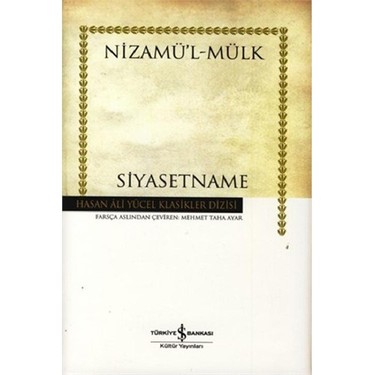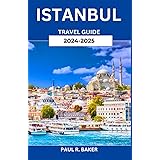Nizam al-Mulk or “Order of the State” (1018 – 1092): (Tus, Iran) The honorary nickname of the powerful Seljuk vizier Abu Ali al-Hasan ibn Ali of Tuslu. In his work called The Book of the State, he opposed the Ismailis and sided with Ghazali against the threats to traditional Islam.
Nizamülmülk, statesman who served as the vizier of the sultans of the Great Seljuk State Tuğrul Bey, Alparslan and Melikşah.
- The value of knowledge is similar to the energy source from which other candles receive light.
- All people should have a job according to their abilities, and the sultan should not allow people to act on the contrary.
- The army must always be at the disposal of the head of state.
Nizamulmulk
- Date of birth 1018
- Place of birth Tus, Iran
- Date of death 14 October 1092
- Place of death Sehne, Burucerd
……………………………………………
• All hope comes after despair.
• There is no need to worry, God’s evil will be good, the sun will rise, God’s help will reach us and if you do what I say, God willing, the fortune will pass on our will.
• Anger should prevail over the anger of the mind, not the mind.
• When the sultan is just and fair, the work of the reaya always finds peace. God knows best…
• A manager should seek the pleasure of Allah in everything he will do, submit to His orders and serve his way and his servant.
• The truth will forgive the evil, let the sun rise once, Allah’s help will reach us…
• If the ruler wishes to be more honorable and dignified than other rulers, he should decorate his own morals with good qualities.
• If someone says something, do not hear it until you verify it. For, those who hasten in this matter will regret it after that, and then it will not be beneficial.
• A person’s maturity and intellect show themselves in not getting angry.
• There are such people that there is no difference between their friendship and enmity. It is best to stay away from such people.
• If a person thinks he is very smart but does not consult with anyone, he will make a mistake that even the most foolish people would not do, and cannot save himself from doing things that he would be ashamed of.
• By eradicating those who blaspheme the blessing, they become hostile to religion-friendly disbelief. By supporting the religion of the truth, by Allah’s leave, it takes root in the desires and perversions of the flesh.
• Let’s do good while there is an opportunity today, because tomorrow the tough day they call helplessness and desperation comes and the opportunity is gone.
• I will always owe you a debt of gratitude, who will not forget your kindness until my last breath.
• The statesman should not persecute, and even if he is not persecuted, he should know whether the men he has assigned are persecuting. Otherwise, the sigh of the oppressed will eventually return and find itself.
• If I have bread to eat, let me spend the rest of my life in peace.
• Nothing in the world is better than generosity and giving bread…
• The difference that distinguishes the ruler from the others is that his rule is passed.
• As the number of something increases, its value decreases and its prestige decreases.
• If the imam’s prayer is broken, the prayers of all that tribe will be broken…
• The sharpness of the intelligence of the sultans is better than the army of a thousand people.
• It is not wise to burden one person with more than one job and leave dozens of people unemployed.
• Making hasty decisions is for the weak, not the mighty.
• There is no friend closer to me than knowledge in this world. Knowledge is worth a treasure; for you preserve the treasure, and knowledge preserves you.
• Woe to that state if someone commissioned by the state violates the rights of the oppressed, orphans and poor!
• Man’s perfection and reason are in his anger; If he gets angry, the anger should prevail over the anger of his mind, not his mind.
• Justice is the basis of property.
• The value of knowledge is similar to the energy source from which other candles receive light.
• Mazdek was saying that ‘property is common among people’. Because humans are God’s servants and Adam’s children. Each one should use the other’s property according to his needs and no one should be deprived of this right. Everyone should be equal in wealth. Upon Mazdek’s words, everyone put their property into partnership.
• All people should have a job according to their abilities, and the sultan should not allow people to act on the contrary.
• The army should always be at the disposal of the head of state.
……………………………………………………………………………………..
• Bütün ümitler ümitsizliğin arkasından gelir.
• Endişeye mahal yok, Hakk şerleri hayr eyler, güneş bir doğsun, Allah’ın yardımı bize erişecek ve dediklerimi yerine getirirseniz inşallah hayırsıyla muradımız üzre devredecektir felek.
• Kızgınlığın aklına değil, aklının kızgınlığına galip gelmesi lazımdır.
• Padişah insaflı ve adil olunca, reayanın işi hep sükun bulur. En iyisini Allah bilir…
• Yönetici, yapacağı her işte Allah’ın rızasını gözetmeli, O’nun emrine boyun eğerek, yoluna ve kuluna hizmet etmelidir.
• Hakk, şerleri hâyr eyler, güneş bir doğsun, Allâh’ın yardımı bize erişecek…
• Hükümdar diğer hükümdarlardan daha şerefli ve itibarlı olmak dilerse kendi ahlakını iyi hasletlerle donatıp süslemelidir.
• Eğer bir kimse bir şey söylerse, tahkik edinceye kadar onu işitmeyiniz. Zira, bu işte acale edenler, ondan sonra pişman olurlar, o zamand da fayda etmez.
• Kişioğlunun olgunluğu ve aklı, kendisini öfkelenmemekte gösterir.
• Öyle insanlar vardır ki, dostlukları ile düşmanlıkları arasında bir fark yoktur. En iyisi, bu tür insanlardan uzak durmaktır.
• Bir kimse kendini çok akıllı bilir de, kimse ile istişare etmezse, en akılsızların dahi yapmayacağı yanlışı yapar, utanacağı işleri işlemekten kendini kurtaramaz.
• Nimete küfran eyleyenlerin kökünü kazıyarak dine dost küfre hasım olur. Hakkın dinine destek olarak Allah’ın izniyle nefsani arzulara ve sapkınlıklara kök söktürür.
• Bugün fırsat var iken iyilik eyleyelim çünkü yarın acizlik ve çaresizlik dedikleri çetin gün çatar da fırsat kaçar.
• Son nefesime kadar bu iyiliğinizi unutmayacak size teşekkürü daima bir borç bileceğim.
• Devlet adamı zulmetmemeli, zulmetmiyorsa bile vazifelendirdiği adamların zulmedip etmediğini bilmelidir. Yoksa mazlumların ettiği ah, eninde sonunda dönüp kendisini bulacaktır.
• Yiyecek ekmeğim var ise hayatımın geri kalanını selamet içinde geçireyim.
• Dünyada hiçbir iş cömertlikten ve ekmek vermekten daha iyi değildir…
• Hükümdarı diğerlerinden ayıran fark onun hükmünün geçmesidir.
• Bir şeyin sayısı arttıkça değeri düşer ve saygınlığı azalır.
• Eğer imamın namazı bozuk olursa, bütün o kavmin namazı bozuk olur…
• Padişahların zekâlarının keskinliği bin kişilik ordudan daha evladır.
• Bir kişiye birden fazla iş yükleyip, onlarca kişiyi işsiz bırakmak akıl kârı değildir.
• Acele karar vermek, kudretli kişilerin değil, zayıfların işidir.
• Şu cihanda bana ilimden daha yakın bir dost bulunmaz. İlim hazineye bedeldir; zira hazineyi sen muhafaza edersin, ilim ise seni muhafaza eder.
• Devletin vazifelendirdiği birisi, mazlumun, yetim ve fukaranın hakkını yerse, vay o devletin haline!
• İnsanın mükemmelliği ve aklı kızmasındadır; eğer kızarsa kızgınlığın aklına değil aklının kızgınlığına galip gelmesi lazımdır.
• Adalet mülkün temelidir.
• İlmin değeri de diğer mumların kendisinden ışık aldığı enerji kaynağına benzer.
• Mazdek, ‘mal insanlar arasında ortaktır’ diyordu. Çünkü insanlar, Tanrı’nın kulları ve Adem’in çocuklarıdır. Her biri ihtiyacına göre ötekinin malını kullanmalı ve hiç kimse bu haktan yoksun kalmamalıdır. Herkes malca eşit olmalıdır. Mazdek’in bu sözleri üzerine herkes malını ortaklığa koymuştu.
• Bütün insanların kabiliyetlerine göre bir işi olmalı, bunun aksine hareket edilmesine padişah izin vermemeli.
• Ordu, devlet başkanının emrine her zaman amade olmalıdır.



















